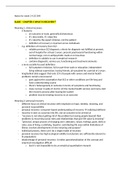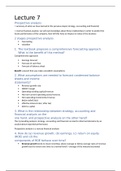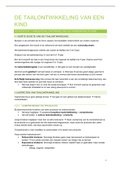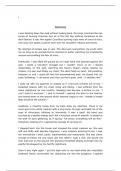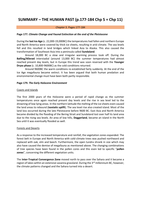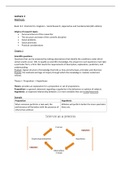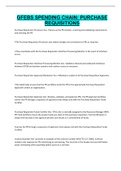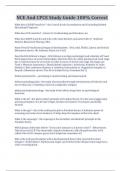Notes for week 3 4.3C SMI
SLADE – CHAPTER 3 WHAT IS RECOVERY?
Meaning 1: clinical recovery
- 4 features:
o an outcome or state, generally dichotomous
o it’s observable, it’s objective
o it’s rated by the expert clinician, not the patient
o definition of recovery is invariant across individuals
- e.g. definition of recovery from SCZ:
o reliable previous SCZ diagnosis, criteria for diagnosis not fulfilled at present,
out of hospital for at least 5 years, present psychosocial functioning within
normal range, not on antipsychotic meds or on low dose
o definition is suitable to use in empirical research
o contains diagnostic, service use, functioning and treatment elements
- a more socially focused definition:
o full symptom remission, full or part-time work or education, independent
living without supervision, having friends, all sustained for a period of 2 years
- longitudinal data suggest that only 11% of people with severe and mental health
problems remain unrecovered
o goes against the assumption that SCZ or other conditions are life-long and
have a deteriorating course
o there’s heterogeneity in outcome in terms of symptoms and functioning
o many recover in spite of (not bc of) the mental health services and many start
the recovery process after leaving the system
o problem may be treating recovery as an outcome
Meaning 2: personal recovery
- different focus on clinical recovery with emphasis on hope, identity, meaning, and
personal responsibility
- personal recovery: consumer-based understanding of recovery individual defined
- recovery is seen as a journey into life, not an outcome to be arrived at
- “recovery is not about getting rid of the problem but seeing people beyond their
problems & recovering social roles and relationships that give life value & meaning”
- “personal, unique process of changing one’s attitudes, values, feelings, goals, skills or
roles; way of living a satisfying, hopeful, contributing life even within limitations of
illness; involves development of new meaning and purpose”
- individual process, there can’t be a single model of recovery
- personal recovery has high ecological validity (conclusions are sufficiently relevant to
its population)
- disadvantage of personal recovery: it makes operationalization of the concept and
empirical investigation difficult
o but it’s not impossible to do an empirical quantitative research
,Are clinical recovery and personal recovery incompatible?
- mental health professionals gravitate towards clinical recovery whereas consumers
go towards spontaneous and personal recovery
- personal recovery encompasses both clinical recovery and spontaneous recovery
- primary focus of clinical recovery is incompatible with primary focus of personal
recovery
Clinical recovery and hope
- hope leads to action based motivation rather than avoidance motivation having
positive goals rather than avoiding negative outcomes
- hope sustains you through inevitable setbacks and suffering
- hope is a problem in mental health services
- many mental health services is the opposite of hope, where staff makes patients feel
powerless, hopeless, discouraged, and disrespected
- self-fulling nature of being told by an expert that you’ll never get back to work, live
independently, or be treatment-free is detrimental
- these statements are often wrong, emphasis on realistic (low) expectations can
destroy hope
Clinical recovery and meaning
- making sense of experience, generating a narrative, provides context and purpose for
future
- importance of meaning has been downgraded in contemporary services
- imposing the biomedical/biopsychosocial model to personal experience removes
meaning
- how do people develop meaning? 4 explanatory models:
o life history (e.g. difficult childhood)
o medical, expressed ambivalence; medication is necessary evil
o spiritual, in line with other studies
o social, constructing self-narrative by telling own story, compromising on the
basis of listener’s response
- more productive to support the person in their search for meaning by offering
understanding, than imposing an explanation
- lack of insight in the beginning may be necessary to allow the person to find their
own meaning, whereas in the clinical recovery lack of insight is always avoided
Clinical recovery and symptoms
- for personal recovery there is no universal stance about symptoms
- if symptom reduction is a predefined goal, then coercive approaches for medication
compliance are justified
- when empowerment, autonomy, and self-determination are goals, then compulsion
to meds is individualized
- we shouldn’t see symptom reduction as primary goal:
o leads to escalating cycle of increasing compulsion
o always viewing symptoms undesirable ignored potential benefits (e.g. mental
illness can co-exist with high achievement)
- personal recovery is not about symptoms but about the relationship with symptoms
, Personal recovery and mental health services
- prioritizing clinical recovery can be helpful for many people in supporting their
personal recovery, but inadequate for others, and even toxic for some
- mental health services should be focused on promoting personal recovery bc:
o personal recovery places more value on the knowledge of the individual
(epistemological)
o acting in professionally defined best interests of the patient should not be a
primary value of services (ethical)
o most common treatment (meds) does not cure, central promise of clinical
recovery is not fulfilled (effectiveness)
o their life has not been safe in our hands (empowerment)
o national policy requires a focus on personal recovery (policy-based)
SLADE – CHAPTER 9 THE PERSONAL RECOVERY FRAMEWORK
Domains of personal recovery
SLADE – CHAPTER 3 WHAT IS RECOVERY?
Meaning 1: clinical recovery
- 4 features:
o an outcome or state, generally dichotomous
o it’s observable, it’s objective
o it’s rated by the expert clinician, not the patient
o definition of recovery is invariant across individuals
- e.g. definition of recovery from SCZ:
o reliable previous SCZ diagnosis, criteria for diagnosis not fulfilled at present,
out of hospital for at least 5 years, present psychosocial functioning within
normal range, not on antipsychotic meds or on low dose
o definition is suitable to use in empirical research
o contains diagnostic, service use, functioning and treatment elements
- a more socially focused definition:
o full symptom remission, full or part-time work or education, independent
living without supervision, having friends, all sustained for a period of 2 years
- longitudinal data suggest that only 11% of people with severe and mental health
problems remain unrecovered
o goes against the assumption that SCZ or other conditions are life-long and
have a deteriorating course
o there’s heterogeneity in outcome in terms of symptoms and functioning
o many recover in spite of (not bc of) the mental health services and many start
the recovery process after leaving the system
o problem may be treating recovery as an outcome
Meaning 2: personal recovery
- different focus on clinical recovery with emphasis on hope, identity, meaning, and
personal responsibility
- personal recovery: consumer-based understanding of recovery individual defined
- recovery is seen as a journey into life, not an outcome to be arrived at
- “recovery is not about getting rid of the problem but seeing people beyond their
problems & recovering social roles and relationships that give life value & meaning”
- “personal, unique process of changing one’s attitudes, values, feelings, goals, skills or
roles; way of living a satisfying, hopeful, contributing life even within limitations of
illness; involves development of new meaning and purpose”
- individual process, there can’t be a single model of recovery
- personal recovery has high ecological validity (conclusions are sufficiently relevant to
its population)
- disadvantage of personal recovery: it makes operationalization of the concept and
empirical investigation difficult
o but it’s not impossible to do an empirical quantitative research
,Are clinical recovery and personal recovery incompatible?
- mental health professionals gravitate towards clinical recovery whereas consumers
go towards spontaneous and personal recovery
- personal recovery encompasses both clinical recovery and spontaneous recovery
- primary focus of clinical recovery is incompatible with primary focus of personal
recovery
Clinical recovery and hope
- hope leads to action based motivation rather than avoidance motivation having
positive goals rather than avoiding negative outcomes
- hope sustains you through inevitable setbacks and suffering
- hope is a problem in mental health services
- many mental health services is the opposite of hope, where staff makes patients feel
powerless, hopeless, discouraged, and disrespected
- self-fulling nature of being told by an expert that you’ll never get back to work, live
independently, or be treatment-free is detrimental
- these statements are often wrong, emphasis on realistic (low) expectations can
destroy hope
Clinical recovery and meaning
- making sense of experience, generating a narrative, provides context and purpose for
future
- importance of meaning has been downgraded in contemporary services
- imposing the biomedical/biopsychosocial model to personal experience removes
meaning
- how do people develop meaning? 4 explanatory models:
o life history (e.g. difficult childhood)
o medical, expressed ambivalence; medication is necessary evil
o spiritual, in line with other studies
o social, constructing self-narrative by telling own story, compromising on the
basis of listener’s response
- more productive to support the person in their search for meaning by offering
understanding, than imposing an explanation
- lack of insight in the beginning may be necessary to allow the person to find their
own meaning, whereas in the clinical recovery lack of insight is always avoided
Clinical recovery and symptoms
- for personal recovery there is no universal stance about symptoms
- if symptom reduction is a predefined goal, then coercive approaches for medication
compliance are justified
- when empowerment, autonomy, and self-determination are goals, then compulsion
to meds is individualized
- we shouldn’t see symptom reduction as primary goal:
o leads to escalating cycle of increasing compulsion
o always viewing symptoms undesirable ignored potential benefits (e.g. mental
illness can co-exist with high achievement)
- personal recovery is not about symptoms but about the relationship with symptoms
, Personal recovery and mental health services
- prioritizing clinical recovery can be helpful for many people in supporting their
personal recovery, but inadequate for others, and even toxic for some
- mental health services should be focused on promoting personal recovery bc:
o personal recovery places more value on the knowledge of the individual
(epistemological)
o acting in professionally defined best interests of the patient should not be a
primary value of services (ethical)
o most common treatment (meds) does not cure, central promise of clinical
recovery is not fulfilled (effectiveness)
o their life has not been safe in our hands (empowerment)
o national policy requires a focus on personal recovery (policy-based)
SLADE – CHAPTER 9 THE PERSONAL RECOVERY FRAMEWORK
Domains of personal recovery


